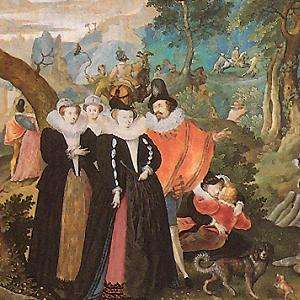Love's Labour's Lost

"And why anyone should say that Love's Labour's Lost is a bad play, the Lord He knoweth; for to my mind it is one of the most réussi things of its kind ever made ... it is all pure fairy-tale; and some of the loveliest lines in the lyrical-witty mode ever written."
Love's Labour's Lost is a comedy by William Shakespeare. The King of Navarre and his attendant lords make a vow to devote themselves to scholarship and put away interest in women for three years -- just before the Princess of France and her attendant ladies arrive for a visit. Hilarity Ensues.
It's not among Shakespeare's most popular plays. This may be largely due to the style, which has been described as "flamboyantly intellectual", full of wordplay and references to contemporary scholarly interests, many of which have not dated well. Also, for a romantic comedy it has a romantically unsatisfying ending, with all the lovers separated, to (maybe) be reunited in the future.
This latter point probably fed the popularity of the persistent rumour that Shakespeare wrote a now-lost sequel titled Love's Labour's Won[1].
There was a film adaptation in 2000, directed by and starring Kenneth Branagh as well as Nathan Lane, Allesandro Nivolla, Alicia Silverstone, Timothy Spall, and Adrian Lester.
- Altum Videtur: Used frequently, often with a Genius Bonus or two. (In fact, all those obscure references--meant for its target audience of Elizabethan college students--have lead to the play's obscurity in modern times, as it's rarely chosen by directors for performance.) Moth lampshades this trope:
They have been at a great feast of languages, and stolen the scraps.
- Beta Couple: And a Gamma, and a Delta, and an Epsilon, and... "More sacks to the mill!"
- Captain Obvious: Don Armado.
- Cool Old Guy: Boyet (although, like all Elizabethan Cool Old Guys, also something of a Dirty Old Man)
- Department of Redundancy Department: Nearly every word spoken by Don Armado, Holofernes and Nathaniel. Especially Don Armado.
- Get Thee to a Nunnery: There are about four puns on the word "light", the most obscure of which is probably the implication that a "light woman" is promiscuous. Knowing the different meanings makes the argument between Katherine and Rosaline at the beginning of Act 5, Scene 2 funnier, but also hints at cattiness.
- Hurricane of Puns
- I'm a Man, I Can't Help It: In his Establishing Character Moment at the beginning, Berowne gives a whole speech about this as his "excuse" for possibly breaking his oath. As he predicts, this trope turns out to be true of all the other guys in the play as well.
- In Medias Res
- I Will Wait for You
- Malaproper
- Love Letter Lunacy: played for laughs.
- Miles Gloriosus: Don Armado
- Mood Whiplash: Right at the end, with the announcement of the death of the King of France.
- Mouthy Kid: Moth.
- No Loves Intersect
- Paper-Thin Disguise
- Purple Prose: Don Armado writes and speaks in a combination of this trope, Altum Videtur and Department of Redundancy Department. It's an incredible thing to behold.
- Rash Equilibrium
- Sequel Hook: the lost play Love's Labours Won. Although if Doctor Who is right about it, we're better off not knowing...
- Servile Snarker: Moth to Don Armado.
- Sesquipedalian Loquaciousness: Particularly Don Armado and Holofernes
- Costard has a moment, too. The fact that he knows the word "Honorificabilitudinitatibus"--and can say it correctly--calls his "bumbling, uneducated country guy" status somewhat into question.
- Show Within a Show: The "Nine Worthies"
- Tree Cover
- Who Is This Guy Again?: Ferdinand, King of Navarre. Who's never actually called "Ferdinand" except in dialogue tags and stage directions, so you can watch the entire play and never find out his first name.
The 2000 film adaptation provides examples of:
- Adaptation Distillation: Most of the original play was cut. Not necessarily a bad thing.
- Crowd Song: "No Business Like Show Business"
- Exposition: Done in the form of a newsreel several times throughout the movie, in order to cover some of the information cut from the original play. Your Mileage May Vary on whether or not this is an improvement.
- Final Love Duet: "They Can't Take That Away from Me"
- Hakuna Matata: "I'd Rather Charleston"
- The Musical: featuring songs from classic 1930s musicals, which can be found here.
- Pragmatic Adaptation: see Adaptation Distillation.
- Setting Update: World War II
- World of Ham: Done on purpose, as a sendup of classic musicals from the 1930s.
- World War II
- ↑ although at least one record exists of a "Love's Labours Won" by Shakespeare, it is thought now to be the title of an existing work - possibly "Much Ado", "Taming of the Shrew" or "The Merchant of Venice"